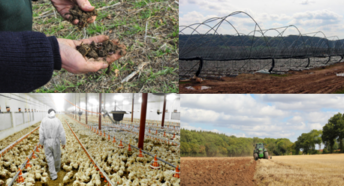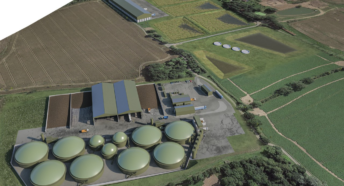Ecological concern over EA permitted Anaerobic Digester in Wye Catchment
CPRE Herefordshire, alongside Friends of the River Wye and Save the Wye, is deeply alarmed by the Environment Agency’s (EA) decision to grant an environmental permit for a controversial Anaerobic Digester (AD) proposed at Whitwick Manor, Herefordshire.
The permit for this Anaerobic Digester (AD) at Whitwick Manor was issued despite the development not yet having planning permission and amidst growing concerns about the health of the River Lugg and wider Wye catchment. The EA granted the permit on the 1st August and said it had consulted but received no responses from local councils, organisations or members of the public. Yet the ‘consultation’ was simply a notice on a government website, which the public and local environmental groups knew nothing about. By contrast, hundreds of objections to the development have been submitted to Herefordshire Council via the planning portal demonstrating high public interest, and planning permission is yet to be determined.
The River Lugg is in a critical state, with Natural England classifying it as ecologically degraded. Recent data highlights that sub-catchments near the proposed AD site are among the most phosphate-polluted areas of the Wye catchment, exacerbating an already dire situation.
While the AD plant’s proponent, Nicholas Layton is proposing to build an Anaerobic Digestion unit at Whitwick Manor, between Hereford and Bromyard, which he states would take around 100,000 tonnes of poultry manure a year alongside apple pomace and liquid wastes, and create natural gas to power thousands of homes. CPRE Herefordshire, alongside other local environmental groups, fear the risks outweigh the benefits. These risks include potential over-application of digestate, further pollution, and the possibility of catastrophic incidents such as spills or gas leaks—risks well-documented in Environment Agency reports.
Herefordshire Council’s initial Habitats Regulations Assessment for the AD plant concluded that it would have an adverse effect on the River Wye’s integrity and could not legally proceed. Although the applicant has since revised the plans, significant questions remain unanswered.
CPRE Herefordshire Director, Andrew McRobb, commented:
“We think it’s bad practice for the Environment Agency to issue an environmental permit before planning permission has been determined and we blame the government for this poor process. Previously, the EA issued permits in lock-step with planning and that was much more understandable. The process today could be seen as influential and prejudicial to planning decisions so the government should change it. The EA said it had received no responses to its consultation on the permit, but we and the public didn’t even know about it. Granting the permit is premature and seems to ride roughshod over our democratic process of determining these applications in the round, with proper scrutiny and local expertise. Given the considerable concerns about the health of the Lugg catchment, Natural England’s downgrading of its ecological health and the restrictions on the building industry, we are mystified as to how the permit was granted”.
Tom Tibbits, Chair of Friends of the River Wye, said:
“We can’t understand why the Environment Agency has granted an Environmental Permit to a development that will concentrate high volumes of poultry manure in the most sensitive part of the River Lugg catchment. We’re deeply concerned. Given the history of AD plants and pollution incidents, as documented by the Environment Agency themselves, they of all people should have good reason to treat this proposal with exceptional caution. There is a very real risk of a catastrophic pollution event in the Lugg as a result of plant malfunction or operator error. Furthermore, the cumulative impact of the development will not have been considered by the EA in the permitting process. Failure to consider the cumulative impact is why so many polluting developments were allowed in the first place and this approach must change. We feel extremely let down by those who should be protecting our environment, and call on Natural England and Herefordshire Council to take heed of all the evidence suggesting this could be a disaster. Surely the precautionary principle must apply?”
The planning process for this development must include rigorous scrutiny of its total environmental impact. CPRE Herefordshire urges Herefordshire Council and Natural England to consider all evidence carefully, including the cumulative impact of this project on an already fragile environment.
CPRE Herefordshire and other environmental groups remain committed to protecting the Wye catchment and advocating for sustainable development that prioritises the health of our natural environment. You can read our thoughts in full about anaerobic digesters here.







